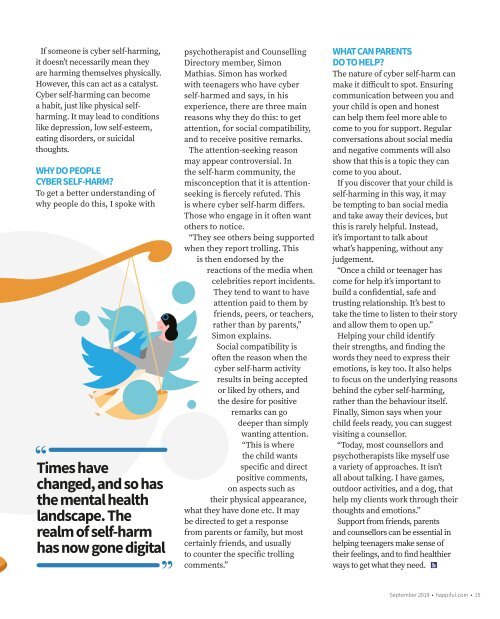You also want an ePaper? Increase the reach of your titles
YUMPU automatically turns print PDFs into web optimized ePapers that Google loves.
If someone is cyber self-harming,<br />
it doesn’t necessarily mean they<br />
are harming themselves physically.<br />
However, this can act as a catalyst.<br />
Cyber self-harming can become<br />
a habit, just like physical selfharming.<br />
It may lead to conditions<br />
like depression, low self-esteem,<br />
eating disorders, or suicidal<br />
thoughts.<br />
WHY DO PEOPLE<br />
CYBER SELF-HARM?<br />
To get a better understanding of<br />
why people do this, I spoke with<br />
Times have<br />
changed, and so has<br />
the mental health<br />
landscape. The<br />
realm of self-harm<br />
has now gone digital<br />
psychotherapist and Counselling<br />
Directory member, Simon<br />
Mathias. Simon has worked<br />
with teenagers who have cyber<br />
self-harmed and says, in his<br />
experience, there are three main<br />
reasons why they do this: to get<br />
attention, for social compatibility,<br />
and to receive positive remarks.<br />
The attention-seeking reason<br />
may appear controversial. In<br />
the self-harm community, the<br />
misconception that it is attentionseeking<br />
is fiercely refuted. This<br />
is where cyber self-harm differs.<br />
Those who engage in it often want<br />
others to notice.<br />
“They see others being supported<br />
when they report trolling. This<br />
is then endorsed by the<br />
reactions of the media when<br />
celebrities report incidents.<br />
They tend to want to have<br />
attention paid to them by<br />
friends, peers, or teachers,<br />
rather than by parents,”<br />
Simon explains.<br />
Social compatibility is<br />
often the reason when the<br />
cyber self-harm activity<br />
results in being accepted<br />
or liked by others, and<br />
the desire for positive<br />
remarks can go<br />
deeper than simply<br />
wanting attention.<br />
“This is where<br />
the child wants<br />
specific and direct<br />
positive comments,<br />
on aspects such as<br />
their physical appearance,<br />
what they have done etc. It may<br />
be directed to get a response<br />
from parents or family, but most<br />
certainly friends, and usually<br />
to counter the specific trolling<br />
comments.”<br />
WHAT CAN PARENTS<br />
DO TO HELP?<br />
The nature of cyber self-harm can<br />
make it difficult to spot. Ensuring<br />
communication between you and<br />
your child is open and honest<br />
can help them feel more able to<br />
come to you for support. Regular<br />
conversations about social media<br />
and negative comments will also<br />
show that this is a topic they can<br />
come to you about.<br />
If you discover that your child is<br />
self-harming in this way, it may<br />
be tempting to ban social media<br />
and take away their devices, but<br />
this is rarely helpful. Instead,<br />
it’s important to talk about<br />
what’s happening, without any<br />
judgement.<br />
“Once a child or teenager has<br />
come for help it’s important to<br />
build a confidential, safe and<br />
trusting relationship. It’s best to<br />
take the time to listen to their story<br />
and allow them to open up.”<br />
Helping your child identify<br />
their strengths, and finding the<br />
words they need to express their<br />
emotions, is key too. It also helps<br />
to focus on the underlying reasons<br />
behind the cyber self-harming,<br />
rather than the behaviour itself.<br />
Finally, Simon says when your<br />
child feels ready, you can suggest<br />
visiting a counsellor.<br />
“Today, most counsellors and<br />
psychotherapists like myself use<br />
a variety of approaches. It isn’t<br />
all about talking. I have games,<br />
outdoor activities, and a dog, that<br />
help my clients work through their<br />
thoughts and emotions.”<br />
Support from friends, parents<br />
and counsellors can be essential in<br />
helping teenagers make sense of<br />
their feelings, and to find healthier<br />
ways to get what they need.<br />
<strong>September</strong> <strong>2019</strong> • happiful.com • 15

















